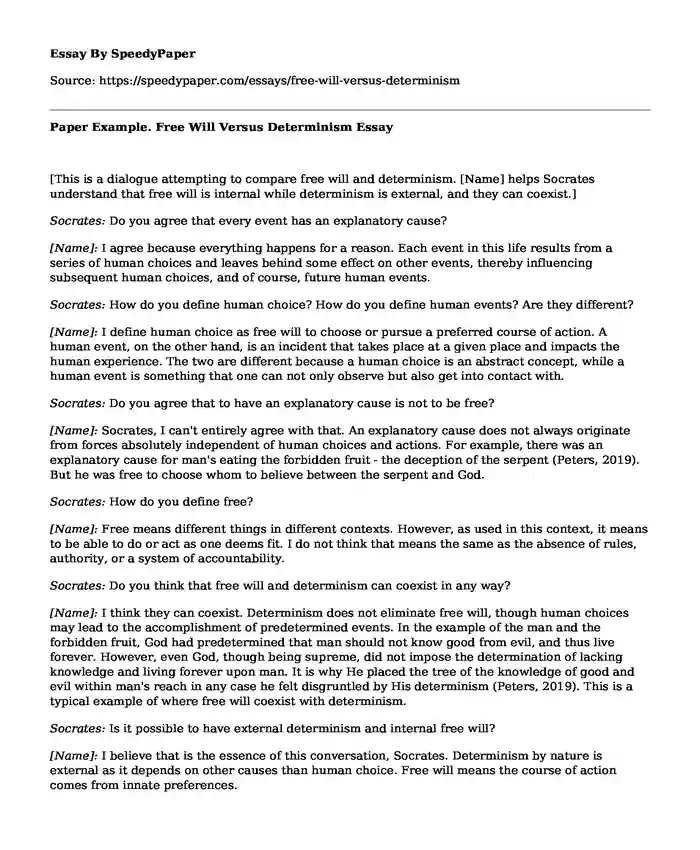
| Type of paper: | Essay |
| Categories: | Intelligence Philosophers |
| Pages: | 2 |
| Wordcount: | 473 words |
[This is a dialogue attempting to compare free will and determinism. [Name] helps Socrates understand that free will is internal while determinism is external, and they can coexist.]
Socrates: Do you agree that every event has an explanatory cause?
[Name]: I agree because everything happens for a reason. Each event in this life results from a series of human choices and leaves behind some effect on other events, thereby influencing subsequent human choices, and of course, future human events.
Socrates: How do you define human choice? How do you define human events? Are they different?
[Name]: I define human choice as free will to choose or pursue a preferred course of action. A human event, on the other hand, is an incident that takes place at a given place and impacts the human experience. The two are different because a human choice is an abstract concept, while a human event is something that one can not only observe but also get into contact with.
Socrates: Do you agree that to have an explanatory cause is not to be free?
[Name]: Socrates, I can't entirely agree with that. An explanatory cause does not always originate from forces absolutely independent of human choices and actions. For example, there was an explanatory cause for man's eating the forbidden fruit - the deception of the serpent (Peters, 2019). But he was free to choose whom to believe between the serpent and God.
Socrates: How do you define free?
[Name]: Free means different things in different contexts. However, as used in this context, it means to be able to do or act as one deems fit. I do not think that means the same as the absence of rules, authority, or a system of accountability.
Socrates: Do you think that free will and determinism can coexist in any way?
[Name]: I think they can coexist. Determinism does not eliminate free will, though human choices may lead to the accomplishment of predetermined events. In the example of the man and the forbidden fruit, God had predetermined that man should not know good from evil, and thus live forever. However, even God, though being supreme, did not impose the determination of lacking knowledge and living forever upon man. It is why He placed the tree of the knowledge of good and evil within man's reach in any case he felt disgruntled by His determinism (Peters, 2019). This is a typical example of where free will coexist with determinism.
Socrates: Is it possible to have external determinism and internal free will?
[Name]: I believe that is the essence of this conversation, Socrates. Determinism by nature is external as it depends on other causes than human choice. Free will means the course of action comes from innate preferences.
References
Peters, T. (2019). Free Will in Science, Philosophy, and Theology. Theology and Science, 17(2), 149-153. https://doi.org/10.1080/14746700.2019.1596215
Cite this page
Paper Example. Free Will Versus Determinism. (2023, Apr 05). Retrieved from https://speedypaper.com/essays/free-will-versus-determinism
Request Removal
If you are the original author of this essay and no longer wish to have it published on the SpeedyPaper website, please click below to request its removal:
- American History Essay Sample: Why the American Revolution Was Revolutionary
- Finance Essay Sample: Uses of a Cash Flow Statement
- Essay Sample: Administration of Adalimumab (Humira)
- Does the Good Little Boy Really Have Good Intentions? Research Paper Sample
- Log in | HYPERLINK "https://www.emeraldinsight.com/action/registration?redirectUri=%2Fdoi%2Fabs%2F10.1108%2FJMTM-03-2018-0099" Register
- Essay Example. Application of Utilitarian and Kant's Ethics in Climate Change
- Report on Leadership Insights: Nehemiah's Strategy, Ezra's Teachings, and Personal Contribution Impact
Popular categories




